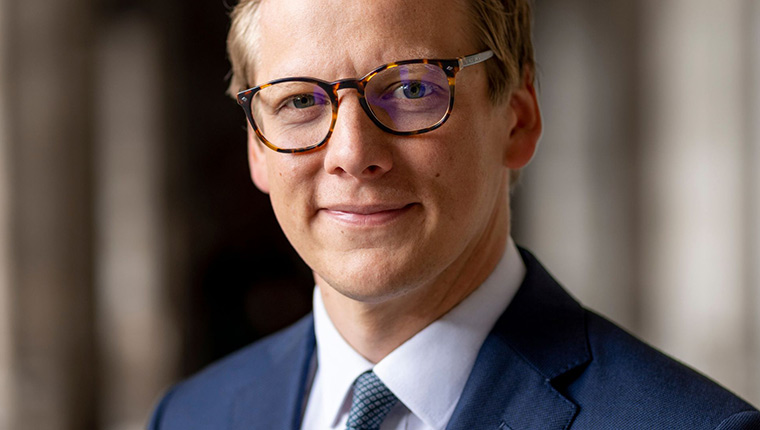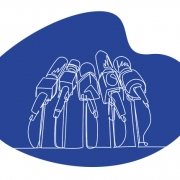Party conference season, the Trump phenomenon, and preparing for the next UK General Election: Media interview with The Daily Telegraph’s political editor Ben Riley-Smith
The last two weeks have seen both the Conservatives and Labour hold their annual Party Conferences. Ben Riley-Smith, political editor at The Telegraph, was there to cover both of them as the two major UK parties prepare for a General Election.
Ben has covered many of the major political moments during his 11 years of reporting at The Telegraph, with the 13 years of Conservative Government covered in his first book The Right to Rule. He has reported on the seismic shift in UK politics following the Brexit referendum, and followed political unrest in the US, having become US editor shortly after Donald Trump was elected President.
We caught up with him to discuss the Party Conference season this year, covering such a difficult period in American politics, and the key differences between political and general news reporting you should know about.

What are your favourite things about this time of year in political journalism?
The Party Conferences are kind of chaotic to cover as a journalist because you’re trying to stay across all news that is emerging. You almost don’t have as many reporters as potential news sources. There’s what’s happening in the conference hall itself and from the beginning to the end of the day, there are speeches that need to be covered. Then there are the fringe events which are often panels of four people where ministers or shadow ministers will speak more freely in a much more unprepared setting.
Sometimes they say things that are eye-catching, and you need to jump on them, but there are more fringes than we have reporters so trying to work out which ones to prioritise and which ones to get to is tricky. Then you have briefings of what’s going on the next day and there’s lots of media interviews with people who might make news, and then you’re trying to find out your own story, so it’s hectic and chaotic.
What was most interesting to cover during the political party conferences this year?
The Conservative and Labour conferences were both fascinating in different ways. Certainly Labour was the more upbeat one. The Tories have been in power for 13 years and close to 20 percentage points behind in the polls. They are trying to work out what to do in the next 12 months to change the political dynamics to get the chance of another term. You saw Rishi Sunak take the stage and the theory of the Tory strategists is they need to make this guy appear to be the change candidate because the party seems to be the status quo. That they could lose because the British electorate appears to be tired and frustrated with politics.
The Prime Minister therefore came out with a series of different big announcements. Some of them the Tories knew would trigger criticism, like the scrapping of HS2, but they were hoping the message to voters was a willingness to change fundamental issues in the country. But then they need to somehow change the political dynamic.
At the Labour Party Conference, they’ve been out of power for the past 13 years and possibly this time next year they’ll be in power. You could feel that optimism and feel that interest from the business community and other third party groups everywhere you went. The hall for Sir Keir Starmer’s speech was absolutely packed, even the standing room areas were full, and some people had to be turned away at the door.
There were business representatives trying to catch the ear of certain Labour people because if you’re a business, or if you’re a public affairs company representing businesses, you know by the end of next year, it could be a Labour government for the next half a decade determining the rules and regulations.
Everywhere you went at the Labour Conference, you got the sense that they genuinely believe come the end of next year, they could be in power.
You have been covering politics at the Telegraph (both UK and US) for over 10 years now, how has the political landscape changed in that time?
I think there’s a very clear before and after moment which was the Brexit referendum, because that was something that threw Britain’s economic and foreign policy strategy up in the air.
Obviously, at the time, the UK Government was urging people not to do it. Cameron and Osborne and likewise, the Labour leadership and likewise the Lib Dem leadership, etc. The major political parties and their leaderships were telling the country not to go down this route, and yet the voters decided otherwise.
Whether you love Brexit or loathe Brexit, I think everybody would agree that it’s just dominated the political discourse for years. Other reforms or issues in British society were pushed to one side to some degree because it needed so much bandwidth in Westminster to work out the shape of what Brexit would be getting through Parliament.
Brexit shook the snowglobe with politics and we’re still seeing things landing.
And what have been some of your favourite stories to cover over the last ten years?
When I was in America as US editor, what was fascinating was the Donald Trump phenomenon. I call it that because it was beguiling and concerning, and trying as an outsider to get your head around that phenomenon was an honour and a real challenge.
I went out there after he won the election and then covered the second election in 2020, and I think in Britain it can be viewed through quite a narrow, slightly stereotypical lens. But going out there and going to a lot of those Southern communities and trying to understand the appeal of Trump was fascinating.
In 2020, I think 70 million Americans voted for him. The stereotypes of these people being xenophobic and ignorant is far too simplistic – it’s a huge swathe of the country.
I remember when I first went out there and went to some of his rallies and some of the communities that voted for him, something that really struck me was how associated he was with the ultimate business success. ‘The Apprentice’ had been running for many years, and if there was one figure in American society who was most linked to business success, it was probably Donald Trump. There was this long-running mantra in American politics that someone needs to come in from outside and shake up Washington DC, and the country doesn’t need a politician, it needs a CEO. And this guy knows how to do it because he’s run businesses and he’s successful. That was certainly the image that was being projected.
Going to those communities and going to his rallies, and trying to understand the nuance of the appeal that he had to certain sections in southern America particularly was fascinating.
What major differences are there between political reporting and general news reporting – what do people need to know?
I think relationship development is a massive part of political journalism. If you’re a general news reporter, jumping on events that come out of the blue and trying to cover them, you’re coming to everything fresh. But if you have a beat like a political reporter does, you somehow need to develop contacts with MPs and advisors and campaigners with all the different political parties.
A lot of the challenge is getting someone who has their eyes on something that you want to know about to talk to you. And striking that right balance can be very difficult because sometimes you think somebody might talk to you because it’s in their best interest to share what they know. Other times you might need to write a story that is critical about a particular MP or particular party who you have a relationship with. You just have to say, this is a massive story and we are covering it even if it’s damaging for you. So it can be quite transactional. You certainly don’t want to cross into the territory where someone thinks they’re your friend because then one day, you might need to write about ‘x Mp’ or ‘x advisor’ or ‘x policy area’. And you want to do that as clearly as possible.
That challenge is central to political journalism; how you develop those relationships, how you convince people to pick up the phone and tell you what’s going on, but also how you keep sufficient distance that if you need to write critical things that you can do.
The other thing with political reporting is that you need to totally strip away your own political views. If you’re a sports correspondent or an arts correspondent, your own personal political views are not that relevant. But for us, you somehow have to go through this process of trying to be as objective as possible and try to switch off your personal political leanings. You’ve got to try to approach every story like that rather than thinking, ‘I hate x and y people or policies’. That’s another critical difference.
For a round-up of how the UK media are covering UK politics, sign up to the weekly Vuelio Point of Order newsletter here.
Check out our round-ups of key mission statements from both the Conservative and Labour leaders at this year’s conferences.

